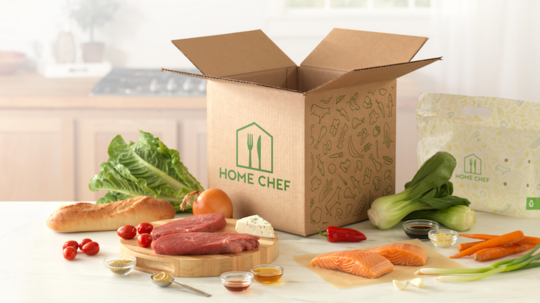
Blue Apron, the New York-based meal kit delivery company, has suffered several major setbacks since going public in June.
It’s seen its stock fall almost 70 percent below its offer price, and its valuation has plummeted from $1.89 billion to $600 million. Last month the company laid off 6 percent of its staff---roughly 300 people---as the company has continued to struggle on the public market.
In fact, Blue Apron is the worst performing major IPO in the U.S. this year.
But that doesn't scare Home Chef, a Chicago-based startup and Blue Apron competitor that launched in 2013. The company has flown under the radar compared to Blue Apron and its fellow competitor HelloFresh, a German company that debuted on the stock marker earlier this month. A handful of other companies are trying their hand at meal kit delivery, including startups Sun Basket and Green Chef, as well as Amazon (via Whole Foods) and Plated, which was acquired by Albertsons for $200 million.
Despite the increasing competition, Home Chef says it's the second largest U.S.-based meal kit service, and the largest private company. With distribution centers in Chicago, Atlanta and L.A., the company now has over 800 employees, half of which are in Chicago.
Last year Home Chef did roughly $100 million in revenue, and it's on track to more than double that this year, Chief Revenue Officer Rich DeNardis said.
Growing to nearly 1,000 employees and generating hundreds of millions in revenue in just four years may sound to some like breakneck growth. But DeNardis assures that Home Chef's plan is to take the "slow and steady approach." The goal is to achieve profitability, rather than spending heavily to gobble up marketshare, he said.
And signs show the plan is working. Home Chef had one profitable quarter this year and another near-break-even one, DeNardis said.
"The big focus is trying to drive to profitability," he said. "The temptation to grow is always quite strong, especially when you take outside capital."
Home Chef has raised $57 million in venture capital, a much smaller haul than its competitors. Blue Apron raised $200 million before going public, and HelloFresh raised over $360 million.
"Our competition has raised huge checks. Huge war chests," DeNardis said. "We’re happy to invest a smaller pool of capital more efficiently."
Home Chef is doing a few things differently to set itself apart in the meal kit space. It offers meals that are more flavorful and intended to reach a broader market, DeNardis said, and the company focuses on meals that are easy to cook. It also recently launched a lunch option, which currently includes salads and will eventually sell sandwiches, DeNardis added.
The key is listening to what customers want and delivering a quality product, DeNardis said. That has resulted in Home Chef seeing customers hang around longer, resulting in lower customer acquisition costs compared to some of its competitors. (High CAC has been one of the struggles for Blue Apron.)
"[More choice] is a big part of why our retention metrics look better," DeNardis said. "It's like going to a restaurant. If you don’t like something on the menu, you’re not going to order."
"If you can keep your customers longer, you can can grow your revenue base faster without having to find new customers," he added. "That is our primary secret to success."
Home Chef was reportedly eyeing a sale earlier this year for more than $600 million. DeNardis declined to comment on the possibility of a sale, but didn't rule it out. When asked about the possibility of an IPO given the struggles seen by Blue Apron, DeNardis said the startup isn't "at the scale where we need to make that decision." He acknowledged that Blue Apron's public offering was a double-edged sword for the industry.
"It legitimized the category," he said. "But they’ve certainly had some problems post IPO that have tainted the whole industry."
But with a plan for slow and steady growth, Home Chef thinks it can remain a major player in the meal kit space.
"This is not a winner take all market," DeNardis said. "Once we build a profitable business, we have a ton more options."








